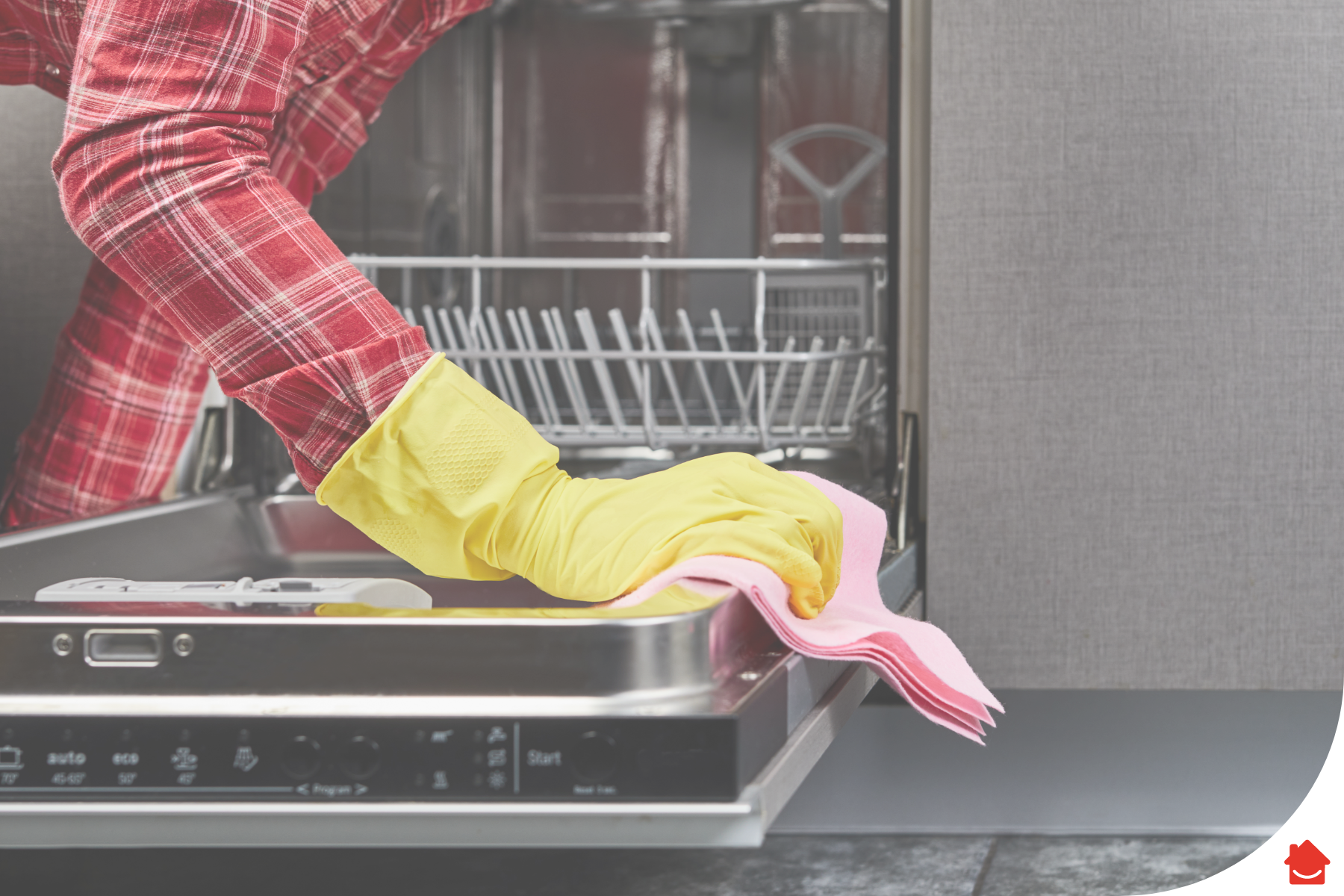Home maintenance advice
How to clean a dishwasher
12 Mar 2021 • 6 minutes


Yes, the appliance that dutifully washes your dishes needs its own spring clean from time to time. Truth be told, if you establish a few key habits that you can do daily, weekly and monthly, it won’t be difficult or time-consuming to keep your dishwasher sparkling all year round. This guide will show you how to clean a dishwasher and tackle dishwasher smells with some step-by-step instructions and helpful tips.
It seems counterintuitive, doesn’t it? In theory, your dishwasher should be cleaning itself every night. It’s not, sadly.
Over time, bits of food, grease, not quite dissolved dishwasher tablets and water minerals build up on the dishwasher’s filter and insides. Not only do these deposits look bad, they eventually cause your dishwasher to stink because of a build-up of bacteria – we all know this thrives in warm, moist, dark places.
If there’s a build-up of gunk it can leave spots and film on your glassware and dishes. It can even potentially cause a blockage that will put your dishwasher out of action and/or damage your dishwasher’s filter and pump, which means you may then need to have it professionally repaired.
If you’ve got a dishwasher blockage, read our how to unblock a dishwasher article to check for and fix common causes.
We know we have to clean our kettles and coffee machines, and our kitchen worktops – so give your dishwasher a little love too and your dishes will come out clean and serene. Luckily, cleaning the dishwasher can be done quickly and easily with items you already have kicking around your cupboards: white vinegar, baking soda.
There are a few small habits you can work in, daily, weekly and monthly to keep your dishwasher in tip-top condition:
Make sure your dishwasher isn’t acting as if it’s a waste disposal – this is the road to ruin because all of the above problems are often down to one culprit: leftover food. By rinsing your dishes before you load the dishwasher, you cut out a major factor in dishwasher unhappiness. This habit is so simple and your machine will really thank you for it!
Another helpful 1-minute habit is to remove any leftover bits of food – the odd bean or piece of pasta, for example – with a bit of kitchen roll after each dishwashing cycle. Pull out the bottom rack and make sure the filter well doesn’t have any lingering bits and bobs.
Keep a spray bottle with white vinegar handy and spray the inside of your machine in between washes to keep it smelling and looking fresh and clean.
The filter is the first point of call for any bits of food and grime to build-up. Give it a 5-minute clean once a week and the more complicated parts of your machine that are deeper inside will be protected.
Take a damp dishcloth or sponge and wipe away any residue or spots that may have splashed or settled onto the interior surface of the door, door edges, handle, or dishwasher controls.
Now your dishwasher is good for another week of heroic, eco-friendly cleaning.
Do a deep clean every month – you’ll need to put on the marigolds for this one.
You can get dishwasher cleaning tablets but we prefer to do it the DIY way because it uses fewer chemicals.
White vinegar is astringently acidic. These properties mean it can easily break down food particles and grime.
Baking soda is a safe, alkaline substance that can also help to get rid of bad smells and grime.
(This is like making bath bombs for your dishwasher!)
Handy dishwasher cleaning tips:
If you have hard water in your area (check your postcode here) your dishwasher may accumulate hard water deposits or mineral build-up. Lemon juice can really help here because the acid works to remove hard water spots.
If you come up against any dishwasher problems that can’t be solved by cleaning or unblocking your dishwasher, it may be time to call in a professional.
Remove particles of food after each cycle and use white vinegar and baking soda to do a monthly deep clean during an empty cycle.
White vinegar and baking soda are effective, non-abrasive dishwasher cleaners.
White vinegar is astringently acidic, which means it’s one of the best natural cleaning products for the inside of your dishwasher because it breaks down grime while being non-abrasive and non-harmful for the environment.
Our help & advice articles cover Plumbing, Home heating, Electrical, Energy-saving and Home maintenance.